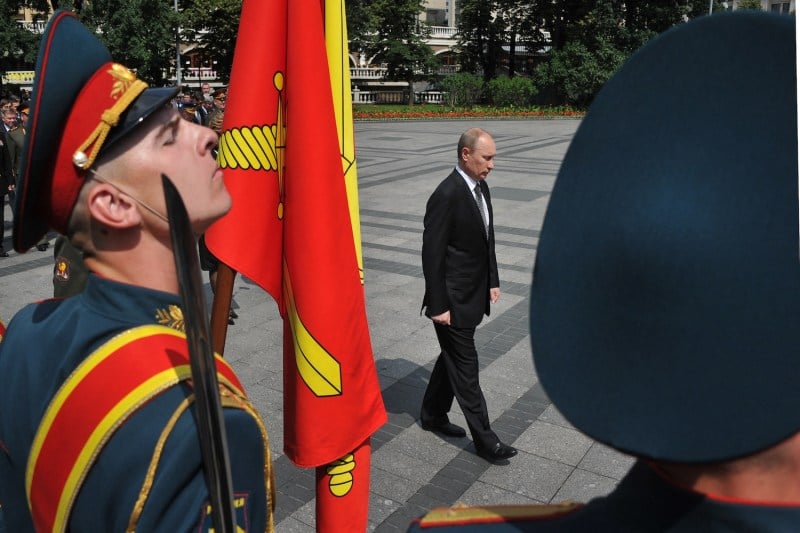Trump’s Real Estate Envoy to the Middle East

Trump’s Real Estate Envoy to the Middle East
Steve Witkoff’s lack of diplomatic experience is his greatest strength—and potentially his fatal weakness.
Donald Trump watches his friend Steve Witkoff speak at the White House Opioid Summit in the East Room of the White House on March 1, 2018 in Washington. MANDEL NGAN/AFP via Getty Images
A common theme of U.S. President Donald Trump’s first term and his three runs for the White House has been hostility toward the so-called “expert class.” This enmity seemed particularly severe when it came to the agglomeration of analysts, officials, journalists, and academics that comprise the U.S. foreign-policy establishment. In 2017, instead of turning to a high-profile diplomat or official to manage his Middle East policy, Trump appointed his son-in-law Jared Kushner.
Kushner had some success, helping negotiate the Abraham Accords. But like every peace processor before him, he failed to get a deal between Israelis and Palestinians. And so, for his second turn in the Oval Office, Trump has turned to another non-expert outsider, Steve Witkoff—to settle the Israel-Hamas war and push for an end to the devastating conflict.
A common theme of U.S. President Donald Trump’s first term and his three runs for the White House has been hostility toward the so-called “expert class.” This enmity seemed particularly severe when it came to the agglomeration of analysts, officials, journalists, and academics that comprise the U.S. foreign-policy establishment. In 2017, instead of turning to a high-profile diplomat or official to manage his Middle East policy, Trump appointed his son-in-law Jared Kushner.
Kushner had some success, helping negotiate the Abraham Accords. But like every peace processor before him, he failed to get a deal between Israelis and Palestinians. And so, for his second turn in the Oval Office, Trump has turned to another non-expert outsider, Steve Witkoff—to settle the Israel-Hamas war and push for an end to the devastating conflict.
It’s wise to have a fresh set of eyes on the problem, and Witkoff brings some important qualifications to the role. As Trump’s golf partner and longtime friend, Witkoff has the president’s ear. He is a successful real estate executive, which means he excels at dealmaking. And he is also, by most accounts a plain-spoken Long Island guy who is not that interested in diplomatic niceties (I know the type, hailing from there myself). And that may be exactly what’s needed for dealing with the Israelis, Palestinians, Qataris, Egyptians, and everyone else who has become so adept at bullshitting Americans.
I can get behind Witkoff—or the idea of him—but here is the problem: The Israel-Palestine conflict is not a real estate deal. No matter how hard Witkoff tried to make Trump’s proposal to take over Gaza and “own it” sound reasonable and in the best interests of Palestinians, it is clear that the United States’ Middle East envoy looks at one of the world’s most difficult problems as something akin to resolving a real estate issue. Not long after Trump announced his plan for Gaza, Witkoff summarized it for Fox News’ Sean Hannity in a way that only a real estate developer could, relaying the Trump administration’s view that, for Palestinians, “a better life is not necessarily tied to the physical space you are in.”
In those few words, Witkoff drained away all the historical complexity of the conflict and reduced it to essentially trading up for a better neighborhood. This may not seem all that different from Kushner, who is also a real estate executive who has mused about Gaza’s beachfront property potential. But the first son-in-law was always a more conventional peace processor than his self-designation of a “disruptor” would suggest.
The real estate mentality would be fine if Gaza and the Israel-Palestine conflict more broadly was just about a border or sharing the territory. It is about that, but also so much more. And those additional factors are far harder to overcome with cajoling, the promise of copious amounts of aid, or outright threats than, say, getting people to agree on land swaps or proper borders.
From a basic starting point, there is no actual agreement on “what is Israel” and “what is Palestine.” That is because the land itself is bound up in closely connected and deeply held ideas about nationalism, identity, national memory, and religion that have produced opposing and uncompromising narratives.
Consider, for example, the religious Zionist movement and Hamas—currently the most dynamic political forces within Israeli and Palestinian societies. They are very different, of course, but they do share something important: their worldviews, which encompass nationalism, identity, national memory, and religion, have sacralized the land between the Jordan River and the Mediterranean Sea. It is either Jewish patrimony consecrated by God or Islamic patrimony consecrated by God, and dividing it would be sacrilege. Witkoff may be able to pressure Israeli Prime Minister Benjamin Netanyahu and Qatari Emir Sheikh Tamim bin Hamad Al Thani into a cease-fire and hostage deal, but it is hard to see how he can get the one-staters of Israel’s right and the one-staters within Hamas to accept the “deal of the century” in whatever form it might take.
This is not just a case of the radicals seeking to undermine the moderates. Even if you isolate and weaken the religious Zionist movement and Hamas, the Israeli and Palestinian narratives lead not to compromise but to a stalemate. For Palestinians and their supporters around the world, Israelis are living on land stolen from its rightful owners—Palestinians. For Israelis and their supporters, Israel represents the restoration of Jews in their homeland and is justice for thousands of years of exile and persecution. To Palestinians, this is a historical injustice that has led to their displacement, dispossession, and statelessness.
What Witkoff confronts is a mutually exclusive set of understandings about the origins of the conflict. This problem has only deepened since October 2023. In addition to the actual war, Israelis, Palestinians, and their supporters are engaged in a struggle over the “real history” of the broader conflict. Each side demands moral absolutism that delegitimizes the claims of the other.
It is unclear whether Witkoff is prepared for the education he is about to get in all the complexities of the Israel-Palestine conflict. Yes, he is coming off considerable success strong-arming the Israelis, Qataris, and Hamas into a cease-fire and hostage deal. But he continues to speak about the importance of advancing the cease-fire beyond the first phase without acknowledging the ways this sets him up for a confrontation with Israel’s right.
And he seems to take the idea that the Qataris—with whom he has done business—have been and will continue to be constructive at face value. Witkoff went so far as to say that the team in Qatar was “doing God’s work.” Given his success, Witkoff is clearly no pushover, but it does seem that, as the war in Gaza dragged on, the Qataris came to regard mediation with Hamas as an end in and of itself. Mostly, he seems to believe that he can move the Israelis and Palestinians to a better place without accounting for the stark reality of what divides them.
Maybe the fresh set of eyes, Trump’s ear, and plain-spoken style will win Witkoff the goodwill, or grudging acceptance, of the players in the never-ending tragedy that has enveloped Israelis and Palestinians for generations. He may have some good ideas that no one else has thought of, but ultimately, he will run into the same buzz saw as Kushner, Martin Indyk, George Mitchell, and Dennis Ross: an existential conflict that, no matter how hard well-meaning Americans work to alter the interests, incentives, and constraints of the parties involved, ultimately remains zero-sum for Israelis and Palestinians.
Trump and Witkoff should look elsewhere for a Nobel Peace Prize.
Steven A. Cook is a columnist at Foreign Policy and the Eni Enrico Mattei senior fellow for Middle East and Africa studies at the Council on Foreign Relations. His latest book, The End of Ambition: America’s Past, Present, and Future in the Middle East, will be published in June 2024. X: @stevenacook
More from Foreign Policy
-

Russian President Vladimir Putin looks on during a press conference after meeting with French President in Moscow, on February 7, 2022. The Domino Theory Is Coming for Putin
A series of setbacks for Russia is only gaining momentum.
-

The container ship Gunde Maersk sits docked at the Port of Oakland on June 24, 2024 in Oakland, California. How Denmark Can Hit Back Against Trump on Greenland
The White House is threatening a close ally with a trade war or worse—but Copenhagen has leverage that could inflict instant pain on the U.S. economy.
-

Donald Trump speaks during an event commemorating the 400th Anniversary of the First Representative Legislative Assembly in Jamestown, Virginia on July 30, 2019. This Could Be ‘Peak Trump’
His return to power has been impressive—but the hard work is about to begin.
-

US Secretary of State Marco Rubio greets employees at the State Department in Washington, DC, on January 21, 2025. The National Security Establishment Needs Working-Class Americans
President Trump has an opportunity to unleash underutilized talent in tackling dangers at home and abroad.











Join the Conversation
Commenting on this and other recent articles is just one benefit of a Foreign Policy subscription.
Already a subscriber?
.
Subscribe
Subscribe
View Comments
Join the Conversation
Join the conversation on this and other recent Foreign Policy articles when you subscribe now.
Subscribe
Subscribe
Not your account?
View Comments
Join the Conversation
Please follow our comment guidelines, stay on topic, and be civil, courteous, and respectful of others’ beliefs.
Change your username |
Log out
Change your username:
CANCEL
Confirm your username to get started.
The default username below has been generated using the first name and last initial on your FP subscriber account. Usernames may be updated at any time and must not contain inappropriate or offensive language.